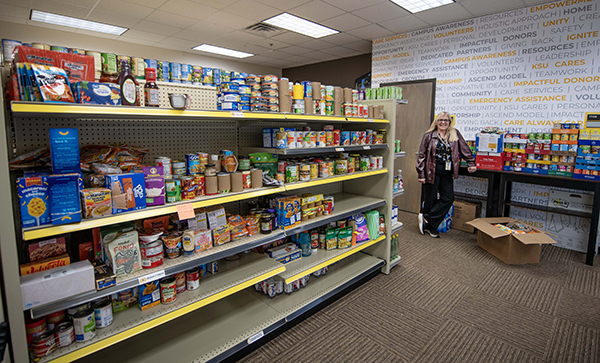Norman J. Radow College Makes Strides in Sustainability Engagement
In the current era of heightened environmental awareness, Kennesaw State University's (KSU) Norman J. Radow College of Humanities and Social Sciences is leading with its "365 Days of Learning & Service" initiative.
KENNESAW, Ga. (Nov 27, 2023) — By James R. Turner

In the current era of heightened environmental awareness, Kennesaw State University's (KSU) Norman J. Radow College of Humanities and Social Sciences is leading with its "365 Days of Learning & Service" initiative.
Each year the initiative unites students, faculty, and staff in addressing contemporary community issues. Both the issue and the initiative's components vary from year to year. This year's focus is on sustainability, which includes environmental, social, and governance matters. During the ’23-’24 academic year, Radow College is hosting events, including guest speakers who practice sustainability in their careers, tours showcasing KSU's sustainability efforts, service-learning classes, and hands-on community engagement activities.
Sustainability is a significant aspect of the university's culture. The Radow College of Humanities and Social Sciences building was the first structure within the University System of Georgia to attain the Silver Leadership in Energy and Environmental Design (LEED) rating, the world's most widely recognized green building certification. Currently, KSU boasts 22 LEED-certified buildings across the Kennesaw and Marietta campuses, featuring eco-friendly materials, energy-efficient systems, and designs that maximize natural light to reduce environmental impact.
In addition, the Department of Geography and Anthropology at Radow College oversees the unique sustainability initiative known as OwlSwap. OwlSwap is dedicated to educating the university community about sustainable, inclusive, and ethical clothing choices and environmental practices, and the profound negative impact the fashion industry has on the environment. It achieves this through monthly clothing swap events where students can exchange items from their wardrobes with their peers, thus reducing clothing and textile waste with the help of OwlSwap volunteers.
KSU's commitment to environmental responsibility includes its approach to hardscape (pavers, sidewalks, planters, etc.) and landscape decisions, such as incorporating green spaces, native plant gardens, and rain gardens in its campus planning, all of which plays a vital role in managing water and promoting biodiversity. In 1976, KSU established the Arboretum on its campus to preserve the original forested area. Today, the Arboretum serves as a space for faculty and students to conduct research and explore various aspects of conservation, including tree density, urban forest management, and soil science.
Sustainability is a multifaceted issue that impacts more than the natural environment.. Last year, Radow College partnered with KSU's Campus Awareness, Resource & Empowerment (CARE) Services, which supports KSU students and the local community, addressing issues such as homelessness, food insecurity, and hunger on campus, for an event called "UnCANny Creations." During this event, teams of students collaborated to build structures using donated canned food and dry goods. This year, the event made the connection between climate change and its impact on food production globally with increasing food costs and food insecurity locally. The event raised awareness about food access challenges and inspired increased food donations. The college nearly doubled its 2022 donations of 840 items to more than 1600 items collected during the 2023 event. After the structures are built and judged in competition, the cans are donated to KSU's CARE Services.
Beyond the campus, Radow College Geography professors initiated the KSU Food Forest project, a 1/3-acre model of sustainable urban agriculture. This project demonstrates how food forest systems can address climate change, enhance food security, and improve health not only on campus but also among local communities.
KSU has also implemented comprehensive waste reduction and recycling programs, with strategically placed recycling bins and a waste reduction campaign encouraging students and staff to minimize their environmental footprint. Collaborating with local organizations, the university has introduced composting initiatives that convert organic waste into nutrient-rich soil for community gardens.
As an academic institution, education is at the core of KSU's sustainability mission. The university offers a diverse range of courses covering topics such as environmental science, renewable energy, and sustainable development, contributing to the development of environmentally conscious leaders. Through the 365 Days of Learning & Service initiative, Radow College collaborates with various KSU organizations to host seminars, workshops, and sustainability-themed events that actively engage students and the local community, promoting meaningful discussions and actions related to environmental conservation. Special events will continue through the spring 2024 semester.
Radow College's holistic approach to sustainability, encompassing renewable energy, eco-friendly infrastructure, waste reduction, education, and community engagement, can serve as a role model and inspiration for institutions throughout the state.











